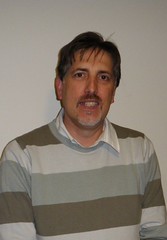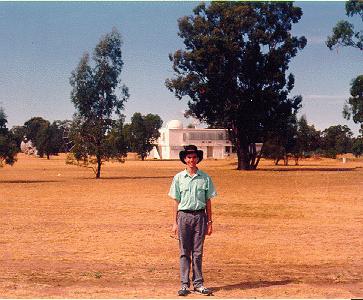Dr Goldberg's website is at
http://neuroimmunedr.com and
contains an essay about CFS.
On September 11th 1998, pediatrician Dr Michael Goldberg came
to the Royal North Shore Hospital to speak about his
experiences and ideas about Chronic Fatigue Syndrome and its
connection with Attention Deficit Disorder and Autism, his
proposal for a name change, and to discuss his treatment
regime.
What started Dr Goldberg's interest in CFS was that in the
early 1980s his wife became ill. She suffered from cognitive
dysfunction, short term memory loss, decreased processing
ability, and abnormal sleep patterns. She had high Epstein-Barr
Virus titers, with a cranked up immune system. Then he started
having children coming into his practice with similar symptoms,
who would "conk out" at around 3pm.
CFS has only been labelled in the last 16 years and only been
accepted as physiological or "real" very recently. Dr Goldberg
suggests that many illnesses now labelled "psychological" may
in fact have an physiological basis. In the last 15-20 years,
the medical profession has considered schizophrenia,
Alzheimer's syndrome, and various other "mental" disorders as
autoimmune mediated physiological illnesses.
The SPECT scan is Dr Goldberg's smoking gun of the
physiological nature of CFS , the fact that temporal lobe
dysfuction is at the heart of the illness and is central to his
argument for a link between CFS, autism and Attention Deficit
disorder. A Single Photon Emission Computer Tomography (SPECT)
scan of the brain shows the pattern of blood flowing in a
living brain.
CFS patients show abnormal SPECT brain scans. The scans reveal
a dimunition of blood flow - hypoperfusion - in the temporal
lobe, occipital parietal lobes, and the cerebellum. He sees a
scalloping and thinning in some cases, and abnormal brain
waves. Magnetic Resonance Imaging (MRI) and X-ray Computer
Tomography scans (3D x-ray CT scans) appear normal for most CFS
patients.
The left temporal lobe is involved with auditory processing and
language, so naturally a decreased left temporal lobe function
will result in sound sensitivity and language problems. The
right temporal lobe is involved with social skills. The
temporal lobes also regulate and coordinate the frontal lobes
of the brain.
Dr Goldberg believes there is an overlap of symptoms and
findings connecting autism, Attention Deficit Disorder, and
Chronic Fatigue Syndrome. He believes they are the same
phenomena, striking the brain at different stages of
development. Simply put, immature brains get autism, young
brains get ADD and adult brains get CFS. Unfortunately this
hypothesis doesn't appear to take into account childhood CFS
that isn't ADD.
Dr Goldberg suggests that CFS and all these illnesses should be
renamed "Neuro-Immune Dysufuction Syndrome" - NIDS. Dr Goldberg
observes that "Austistic Syndrome" and CFIDS and the other NIDS
all involve a "thinning of the brain". How your brain adjusts
to the physiological changes and therefore what symptoms you
will suffer then largely depend at what age this illness
strikes. During his talk, Dr Goldberg illustrated his points
with many SPECT scans, which correlated with the problems the
patients had, and which also reflected the improvements the
patients made when their symptoms improved.
In 50%-70% of ADHD (attention deficit hyperactivity disorder)
cases, it continues to present problems past adolescence. This
has only been recognized in the medical literature in the past
fifteen years.
Previously, in the 1960s and 1970s ADD kids were described as
very bright but hyperactive children, who if you could only get
them to sit still in their seat, would perform brilliantly.
Children labelled with ADD from the 1980s to the present are
described as presenting with meta-cognitive deficits, problems
accessing information, using developmental assessment, they now
consider that they are looking at a large number of learning
disabled children who have speech and language difficulties,
deficits in cognitive and perceptual thought, including
"temporal lobe sequencing deficits", discretional
disorientation and visual perception difficulties, deficits in
intersensory integration, clumsiness. These problems were never
associated with ADD in the past, but they are frequently
discussed in the world of CFS and autism.
Previously autism was thought to be a rare and devastating
handicap that affects 2 in 10 000. Now, from the 1980s onward,
it is found that many kids don't fit this profile very well,
but have been classified that way for convenience.
All these illnesses are linked to an immune disregulatory
phenomenon. Whether caused by a virus or a genetic
predisposition, or environmental changes. Commonly there is a
family history of migraines, eczema, hay fever, asthma and
other autoimmune disorders. He has seen dozens of families
where the mother or father has CFS, an older child with ADD,
and a younger child or two with autism/PDD. This was unheard of
in medical discussions 20 or 30 years ago. There is a
predictive pattern of allergies, sinusitis, pharyngitis,
bronchitis, and recurrent minor illnesses.
At UCLA Dr Goldberg saw autistic children with immune related
symptoms which were regarded as unimportant "epiphenomena". He
hypothesized that if you do the cause of CFS to a young
developing brain, then you get autism, the "young version of
CFS". Austistic children also have hypoperfusion in the
temporal lobes showing on SPECT scans. He suggests that if the
brain "misses" certain stages of development, at some point, it
may never make up for that fully. He hypothesizes that "quiet
ADD" is actually misdiagnosed CFS.
Dr Goldberg's hypothesis is that all these illnesses are a
result of temporal lobe dysfunction. Therefore they should be
labled as Neuro-immune dysfunction syndromes - NIDS.
"Neuro-immune" is the new buzzword in the US National Institute
of Health, and its now being applied to Touret's syndrome, and
obsessive-compulsive behaviour. The press have jumped onto the
environmental illness bandwagon. Interest in HIV has finally
led to interest in the workings of the immune system, and all
of this should help with CFS. Ultimately, the tools that
regulate HIV may help regulate CFS.
The trouble is, without controlled trials based on definable
markers, everyone disputes everything that is being published.
This is the basis of the loudest criticism of Dr Goldberg's
work on CFS, and why many CFS specialists won't act on his
findings. Dr Goldberg wants to see urgent controlled trials,
definable markers and recognition of the illness by
neurologists.
Dr Goldberg has seen the symptoms of a "turned on" immune
system in allergic reactions to a food allergy screen where all
results were shifted to the right of the table. That is, even
where there were no allergies, there were increased immune
responses, so that the table looked normal, but shifted to the
right, towards an increased allegic reaction.
Dr Goldberg says what he observes are not classic allergies,
but "triggers", and warns against milk, dairy products,
chocolate, whole grains and whole wheat. He hypothesizes that
the various immune abnormalities are from a metabolic
abnormality, which in turn has led to an immune problem and
mitochondrial dysfuction.
Other physiological evidence he has seen is that red blood
cells from people with CFS don't separate in serum they way
they do in people without NIDS.
Dr Goldberg had several suggestions, from his practice, of ways
to improve cognition. He suggests modified elimination diets,
antifungal therapies, and antiviral/immune active therapies.
"Healthy" foods from health food shops may be a large part of
the problem he says, and we should avoid health food shops. If
people with CFS take this advice, the health food industry will
lose large amounts of money! Gastro-intestinal immune problems
are a result of "health food" consumption he says. He
encourages patients to go back to basics and eat proteins,
vegetables and low carbohydrates, and not go to the health food
shops for alternatives. For the diet he suggests that safe
fruits include pears, peaches, apples and bannanas. Fish and
pork may be triggers, but red meat otherwise should be safe.
The amino acids in health food stores are NOT pharmaceutical
grade, and therefore are of little use in treatment. Dr
Goldberg recommends keeping kids away from allergenic food for
the first three years of live to avoid triggering NIDS symptoms
in genetically susceptible families.
Dr Goldberg says that kutapressin, a drug made from pig's
liver, is an extremely effective treatment for CFS cognitive
problems. It was licensed in the late 1940s for cold sores,
shingles and other herpes viruses. It was licensed to treat
acne and other chronic viricological inflammations. Kutapressin
is an enzyme that chops every herpes viruses into little
pieces. Patients who have tried it say that it felt like
"somebody threw a light switch". Kutapressin is extremely safe
except in cases of allergy. Allergy is tested for by a skin
test before treatment. Kutapressin is given by intramuscular
injection in the thigh or buttocks. Due to the fact that the
patents have run out, it is unlikely more commercial research
will be performed with kutapressin. However in his practice it
has made an enormous difference to the blood flow in the brain
as displayed on a SPECT scan. In fact after treatment the SPECT
scan shows normal blood flow. It is not a panacea for CFS, but
a very valuable tool, that could point the way to better tools.
For anti-viral treatment, valtrax, zovirax, acyclovir are safe
in the long term, and their use is suggested by high IgG
levels. They attack the herpes viruses Cytomegalovirus and
Epstein Barr virus which cause glandular fever. Valtrax is the
cheaper and more effective drug. Valtrax and zovirax are safe
for children with CFS, and he has given them to children in his
practice. "They brightened up, became more functional and more
tuned in." He found that these were safe medicines for them,
and that they improved their symptoms while on the drugs and
were worse when taken off them. He says that photophobia is a
marker of a viral infection.
If your doctor gives you a choice of antibiotics, then
erythromycin is the one he recommends you choose, as instead of
killing bacteria and thus releasing their toxic load into the
body, it simply paralyses the bacteria, allowing the body to
flush them out safely and cleanly.
He treats patients for yeast infections after a liver function
test with nyseral or dyflucan, and that there is no test for
yeast overgrowth. The kill-off of yeast leads to an achiness,
and headaches which last for two weeks before the patient feels
better. Lamasal is a new long term treatment. Amphoterosyn B is
safe in the long term when its taken orally as its not absorbed
by the gut, whereas intravenously it is toxic.
SSRI (Serotonin Re-uptake Inhibitors) such as prozac, paxil,
zoloft, at very low dosage are recommended from his work on the
temporal lobe to help with sleep problems.
Dr Goldberg worries that in cases where there is a low blood
perfusion in the brain of NIDS patients, that there will be a
slow loss of brain cells by slow starvation of blood.
Dr Goldberg believes that NIDS occurs in people who have
inherited a genetic susceptibility, and that these genes run in
higher IQ families, which is why it was first observed as
"yuppie flu". After all, what are yuppies? They are university
educated, intelligent, bright people. He believes there is a
"higher evolutionary connection". Human evolution has been led
by the fact that humans have been breeding for success in
society, success which requires higher cognition - which means
higher brain function. Selecting for successful high IQ as he
believes humans have been doing for millenia, has led to more
immune sensitive individuals.
A virus such as the common cold does not infect your brain, but
makes you feel spacey, tired and your body will ache due to the
cytokines and interlukins that your immune system produces that
do get into your brain. Dr Goldberg hypothesizes that during
times of stress, trauma, and infection, the immune system has
evolved to protect the brain by slowing down the flow of
infected blood to the brain. However, when this protective
mechanism does not switch off after a week, but continues on,
then you end up with the symptoms typical of CFS.
This extends my famous "PWC Master Race Theory". Briefly,
People With CFS (PWC) learn many tricks to cope with symptoms
of muscle weakness, clumsiness, exhaustion, memory and
concentration problems, lack of endurance, pain, and so on. You
need an unusually flexible mind to be able to cope. When cured
of CFS, people with these tricks - these methods of making more
of a reduced brain and body - will be able to apply these
coping techniques to a healthy brain and body and thus will be
superior human beings. Naturally we will take over the world. I
did not explain this to Dr Goldberg, no sense in scaring the
poor fellow.
Neuro-Immune Dysfuction Sydnrome is the most descriptive of all
the name changes I have so far seen suggested. If Dr Goldberg
is right about the connection between CFS, autism and ADD, and
his name change is adopted, then we can dispense with "chronic
fatigue" at last, and if misguided media person tries to call
our illness "yuppie flu", we can tell them "NIDS to you!"


















 <
<




Recent Comments